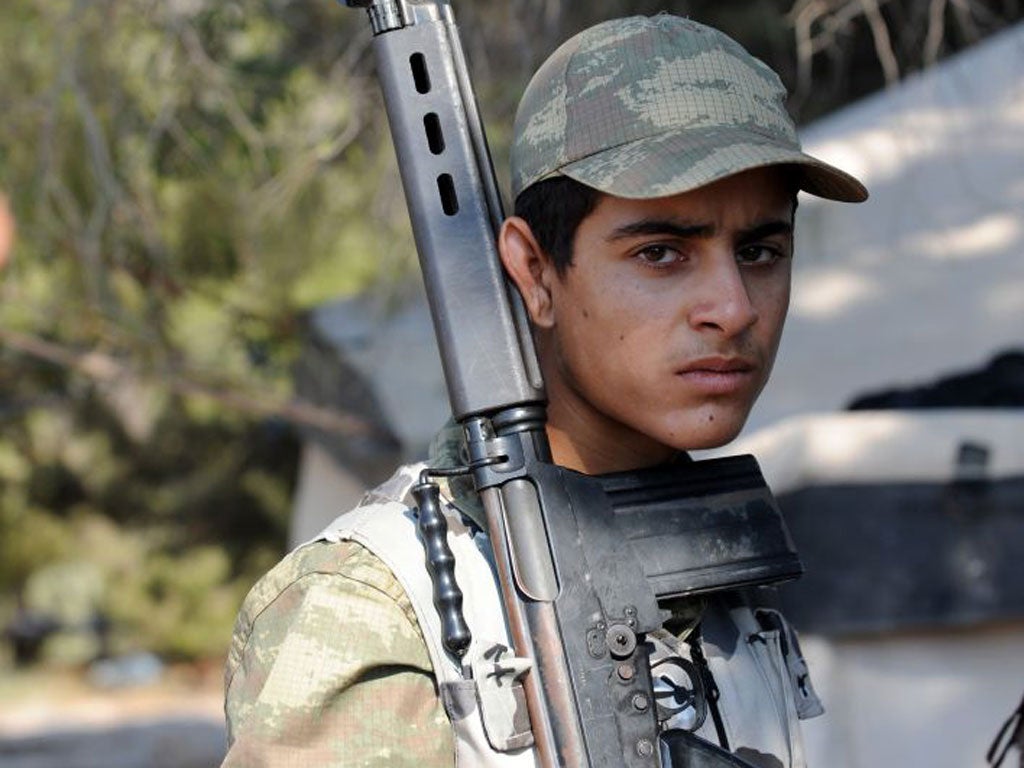Exclusive: How Syria's rebel fighters were sold exploding rifles – by a mystery Briton named ‘Emile’
Opponents of Bashar al-Assad suspect they have been duped by a double agent posing as an arms dealer

Your support helps us to tell the story
From reproductive rights to climate change to Big Tech, The Independent is on the ground when the story is developing. Whether it's investigating the financials of Elon Musk's pro-Trump PAC or producing our latest documentary, 'The A Word', which shines a light on the American women fighting for reproductive rights, we know how important it is to parse out the facts from the messaging.
At such a critical moment in US history, we need reporters on the ground. Your donation allows us to keep sending journalists to speak to both sides of the story.
The Independent is trusted by Americans across the entire political spectrum. And unlike many other quality news outlets, we choose not to lock Americans out of our reporting and analysis with paywalls. We believe quality journalism should be available to everyone, paid for by those who can afford it.
Your support makes all the difference.To the Syrian rebels, the offer was enticing: Kalashnikov AK-47 rifles and ammunition at below-market price, with supplies plentiful. The dealers were convincing: two of them had European passports, one a British passport, and they claimed to have been involved in supplying arms during the Bosnia war.
Three meetings took place in Istanbul between representatives of the rebels and the dealers, including the Briton, calling himself Emile, to organise shipments. An initial payment of around $40,000 was made.
The delivery was on time, as had been a previous shipment. But it soon became apparent that something was wrong.
Rifles exploded during a firefight. There was a second such “accident”, and a third, leading to injuries. An examination of the remaining consignments revealed that propellants inside some of the cartridges had been replaced with ground explosives with three or four times design-pressure, with the aim of bursting them in the breach.
With Syria’s civil war getting increasingly vicious and dirty, the opposition has come across “abandoned” government arms that were proved to have been doctored.
But the presence of the arms traffickers, including the Briton, has led to claims that the Syrian regime is using foreign agents to undermine the opposition.
Abdurrahman Abu-Nasr, a rebel representative who attended one of the meetings with the dealers in Istanbul three weeks ago, recalled “Emile” as a man in his late 40s who was of Arab – part-Syrian – origin. “He spoke fluent English, he told us that he had lived in England. Another man had a Belgian passport, but I think his family were from somewhere like Morocco. They were giving good prices, only around $ 2.50 per round [The average price had gone up to $5 at times].
“The man with the British passport told us he had supplied the Mujahedin in Bosnia, he knew a lot about defence equipment. My friend and I asked whether they were acting on behalf of their governments. They did not admit they were, but did not deny it totally either. It was clever, it left us wondering.”
There is no evidence to suggest that the man calling himself “Emile” has any connection with the British intelligence agencies.
The UK government is supplying “non-lethal” aid to the Syrian opposition, including satellite communications equipment, and thus, say security sources, it would not have been possible for regime agents to have infiltrated such a chain.
Speaking about arms supplies, the Foreign Secretary, William Hague, said recently: “I don’t rule out any option in the future because we don’t know how the situation will develop.” He denied that supplies are being “outsourced” through Qatar or Saudi Arabia.
The rebels who met “Emile” and his colleagues are investigating the role of a conduit who had acted as a referee.
Sabotaging ammunition is not new to counter-insurgency warfare. The British engineered the supply of doctored bullets in the Second Matabele War in the 1890s and the Waziristan campaign in the 1930s. The Americans used the tactic in Vietnam, and both they and the Russians have carried out such operations in Afghanistan.
Join our commenting forum
Join thought-provoking conversations, follow other Independent readers and see their replies
Comments